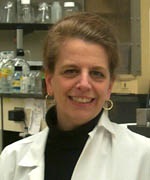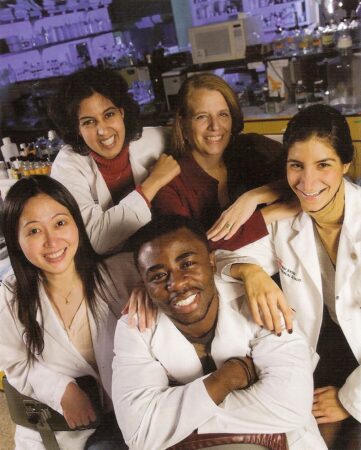By Leslie Krowchenko
As a PhD candidate in endocrinology in the early 1970s, Sylvia Christakos took courses in the State University of New York (SUNY) at Buffalo School of Medicine. She was one of five women in a class of 125 future doctors and researchers.
Fifty years later, one of every two students is a woman.
Christakos, a distinguished Professor in the Department of Microbiology, Biochemistry and Molecular Genetics at Rutgers, New Jersey Medical School, will be recognized March 5 by the Daughters of Penelope District 5 (New Jersey and Delaware). Its tenth Biennial Salute to Women acknowledges her achievements in research related to vitamin D, training and mentoring provided for PhD and post-doctoral students and visiting scientists and the way in which her Greek heritage has influenced her professional stature as a role model and inspiration to women of all ages.

“When our selection committee reviewed her accomplishments, we realized we would be celebrating a woman who is renowned in her field,” said event chair Valerie Vittas. “I had the honor of calling her and she was thrilled to death to learn of the award.”
Raised by strong women, Christakos was well prepared to enter a domain dominated by men. Her grandmother, who left the island of Chios in the early 1900s, founded the first Greek school in New York City. In a time when most women were stay-at-home moms, her mother worked 14-hour days in her floral shop in Queens, read the “Wall Street Journal” and invested in the stock market.
“They were independent women who set high standards for themselves,” she said. “In entering the medical field, it was important to be better than the men.”
Christakos has also been surrounded by a family of faith. Her brother, the late Father Germanos Stavropoulos, Chancellor to Archbishop Iakovos, demonstrated idealism, faith and dedication to others. His life served as a source of inspiration, which she has returned by teaching Greek Orthodox Sunday School for more than 35 years.
The Daughters of Penelope (DOP) offers similar support. Founded in San Francisco in 1929, DOP is an international women’s organization leading in philanthropic, educational and civic activities through community service and volunteerism. Its mission is to promote Hellenism, education, philanthropy, civic responsibility and family and individual excellence through financial donations to a variety of local organizations.

Spending her entire career at Rutgers, Christakos has devoted more than 40 years to teaching and heading one of the leading laboratories in research related to vitamin D, its function and mechanism of action. She has received continuous funding for over 40 years from the National Institutes of Health (NIH) and authored more than 180 publications in peer reviewed journals.
Nicknamed the “sunshine vitamin,” vitamin D helps the body absorb and retain calcium and phosphorous, both critical in building bone. Few foods naturally contain vitamin D, although some like milk, orange juice and cereal are fortified with it, and trace amounts are found in fatty fish such as salmon, mackerel and sardines.
The body also makes vitamin D when sunlight hits one’s skin – active people living in sunny regions get some of their daily allowance by spending time outdoors every day. In less temperate areas, the skin makes a smaller amount in the winter months, especially for older adults.
“People living in the Northeast, for example, receive far less exposure to sunlight,” said Christakos. “A supplement of 1,000 IUs (2,000 for older adults) is recommended daily.”
While vitamin D and osteoporosis are often spoken in the same breath, research has shown it has benefits relating to other diseases. Experimental evidence from studies with mice has suggested a possible connection between vitamin D and cancer risk; its deficiency has been found to be associated with a variety of cancers, including prostate, breast and colorectal. Additional studies with mice have also shown vitamin D may inhibit the progression of autoimmune diseases, such as multiple sclerosis.
Christakos’ accolades extend far beyond the laboratory. She has been a member of the American Society for Bone and Mineral Research since 1980, serving in 2005 as its third woman president. While in the post, she established ASBMR’s Diversity, Equity and Inclusion and Women in Bone and Mineral Research committees.
“Diversity, Equity and Inclusion is the norm today, but at that time it was not,” she said. “The committee is dedicated to issues worldwide and I still serve on it.”
Like the examples set by the women in her family, Christakos strives to be a role model for the next generation of scientists, including supporting the careers of women in the discipline. Rather than merely be their advisor, she aims to be their mentor, especially for the 11 women (of 25 total) PhD students who have studied under her.
“Mentoring other women is an important part of my career,” said Christakos. “My generation of women showed that women are indeed competent professionals and leaders, thus providing a role model for the next generation of women who have a choice to do and become whatever they want and I am proud to support them”
******
The Daughters of Penelope District 5 Tenth Biennial Salute to Women honoring Sylvia Christakos, Ph.D. will be held 2 p.m., March 5, with a cocktail reception at Pines Manor, Edison, New Jersey. The donation is $50 and reservations may be made through Feb. 25. To make a reservation, contact Valerie Vittas (973-432-3425).







